A Light in the Window Read online
Page 20
the office
thursday.fog on the heels of sunshine, 56 deg., barnabas snoring, emma making deposit dear Lord! taken something from me? words cannot express what you have given, do give, that you would love me at all continues to perplex me, i am sorry to say. as we go into Lent ii ponder again and again how the apostles must have felt at losing him, at losing the love that had captured and ennobled and given them something higher than they could have ever known without him. there must have been the deepest despair and disbelief, greater than the ordinary loss of a loved one, until the Holy Spirit arrived on the scene and filled in the blanks, ii have known something of loss, also, in these weeks, these months you have been away, months in which winter has breathed its frost upon our spirits continually, yet i think it is good somehow that we discovered, confessed our feelings for one another and were forced apart to think it through, that at least is true for me, and i am being philosophical about it at the moment, at other moments i could not ask for anything more than to have you here and cook your supper. Afterward, we might sit by the fire and look at the new garden catalogs, there, now, I've run you away with the prospect of such dull evenings, while you might be at the club playing cards or doing the tango.
please do not ever think that you have taken anything from me, but know that you have given me something too precious and amazing to contemplate, and never worry that i won't recognize you. ii would know those blue eyes anywhere, crossed or no.
i kiss you. God bless you and keep you. marge and hal pray for you, as does dooley on occasion.
harold cometh
love, timothy
p.s. nothing poking up, will advise
"He's workin' on his sermon right now, Esther. Can he call you back? He said he has something goin', for a change. He'll call you, or I will. I know it's important. Thirty minutes. Bye."
He could hear her drumming the desktop with her fingers, waiting for him to put the cover on the typewriter.
He swiveled around in his chair. "Well?" he said, pleased with what he had accomplished in less than a half hour. "What did Esther want?"
"You know that big Presbyterian car thing at the Legion Hall on Friday night?"
"Vaguely."
"They asked Esther to do the cakes."
"That was smart," he said, calling up the memory of the cake that had nearly taken him home to glory. Her splendid orange marmalade cake was famed among all the local churches.
"Well, she wants to do somethin' in the triple chocolate category, for a change, somethin' called Better Than Sex Cake. But she's nervous as a cat about makin' a change...torn, she says."
"Aha."
"She wants to know should she come out with a new cake and throw over the old one that's made her famous? She was wantin' to get your answer by eleven, when she has to start bakin'."
"I have an answer, all right."
"What is it?"
"If it ain't broke, don't fix it."
"Amen!"
"Tell Esther I vote for the orange marmalade, hands down."
"That's what I say! Besides," she said, peering over her glasses, "what could be better than sex?"
He thought he was the last person on earth who should be asked such a question. Nonetheless, he had an opinion. "Certainly not a cake."
"I'll call her back," she said.
He was putting on his jacket to leave when the phone rang.
"Timothy?"
Her voice gave him a fine chill, something like that produced by chalk scraping over a blackboard.
"I'm so glad you're still there," said Edith Mallory.
"What can I do for you, Edith?"
"I think it's what I can do for the Children's Hospital," she said mysteriously.
"And what is that?"
"Remember how you urged me to get involved? Well, you were right, of course. Absolutely right, as always."
"Aha."
"Guess what?"
"I can't."
"Oh, Timothy, do loosen up a weensy bit. I'm calling with good news!"
He couldn't help but notice that when the phone rang, the sun had disappeared behind a cloud. "Fire away."
"I'm going to give ten thousand dollars to the Children's Hospital!"
He wished his heart might have leapt at the thought. Ten thousand would help enormously, but words seemed to fail him.
"Oh, all right!" she said, peeved at his silence. "Fifteen!"
He had never before raised five thousand dollars by keeping his mouth shut. "Wonderful, Edith. You'll never know how desperately it's needed and how thoughtfully it will be used."
"I'd like you to take me there to find out, firsthand."
"You mean, you'd like to look around?"
"Of course, meet the director, talk to the doctors. I'd like some personal contact, after all." She sounded petulant.
"What's your schedule?"
"Could we do it right away? Monday, perhaps? Or Tuesday? Which shall it be? Ed can drive us over. Perhaps we'll have lunch."
The very thought gave him a knot in his stomach. "Monday, I speak at the ECW luncheon about Hope House. There's a long meeting on Tuesday with the building committee. How about Wednesday or even Thursday?"
"Impossible."
"Well, then."
There was a frozen silence. She was waiting, he knew, to be courted and cajoled. Perhaps he should break over a little for the Children's Hospital. Maybe Ron Malcolm could fill in with the ECW "Oh, Timothy," she crooned, suddenly thawing. "Why argue over a day or two when children's lives might be in danger? I know how busy, busy, busy you are—of course we can make it Wednesday."
"Thanks for being flexible."
"Flexible? Me? How sweet of you to say that." He heard her take a deep drag on her cigarette.
"Well, then, Wednesday. What time?"
"Ten would be good."
"Let me call the hospital, and I'll get back to you."
"Perfect!" she said.
It wasn't a word he would have chosen.
Ever since Christmas, the thought of the amethyst brooch seemed to hover in his thoughts. Where was it, anyway? He felt a mild distress that he might have lost it. He hadn't seen it in—how long? Had he seen it since he moved here? Yes, he remembered thinking it should be taken to a jeweler and cleaned.
He closed his eyes, trying to visualize where he had put it. Why hadn't he come across it from time to time, if it weren't altogether lost?
He dug through the top lefthand drawer of his chest, where he kept things he didn't need but didn't want to toss out, either. Not there.
He opened his closet door and peered at the top shelves. Maybe. He took the chair that stood by the blanket chest in the hall and set it inside the closet. He took down several of the smaller boxes and put them on the floor by the bed.
Little puffs of dust rose up as he opened them, one by one. Christmas decorations from his last parish. He had searched high and low for these. What were they doing up there?
Buttons. An entire box of buttons. All emptied out of his mother's sewingmachine drawer. He would set them aside for Puny.
Then, the box of his mother's monogrammed handkerchiefs, her silver vanity mirror, a beaded evening bag, a lace collar, a hat pin with filigree work. There, too, was her gold wedding band, with a ribbon slipped through it and tied firmly. She had tied the ribbon herself, he suspected, when she had to remove her ring toward the end.
With the scent of age and mustiness, he also smelled her special smell; perhaps it had been gardenias. So faint, so elusive, it was scarcely there.
"Mother..." he said aloud, feeling an odd comfort in the word, the old familiarity of it.
He thought of Miss Sadie coming across the little socks and the certificate. Her departed loved ones seemed bent on speaking to her down the years.
Nearly six decades ago, Willard Porter had carved a message on a crossbeam of the home he hoped to give Sadie Baxter as his bride. Last summer, Miss Sadie had asked her rector to go look at the beam and tell her what was carved
there. The legend he found was full of Willard's passionate belief that they would marry and that peace would reign in their lives at last.
Now, Miss Sadie's mother had spoken, helping her find Olivia. In his opinion, Rachel Baxter meant for her daughter to discover the certificate soon after her death. Why would it have been placed so casually in a dressing table, where a daughter would surely look when going through her mother's effects? Clearly, Rachel Baxter had tried to say, Run and find your sister!
What would his own mother say if she could speak to him now? He looked at the lace collar that she had prized, that had been so beautiful on her.
He realized his leg had gone numb, that he'd been sitting among the boxes for a long time. Yet, he hadn't found the brooch. He slid the boxes under the bed and got up, feeling as if his mind had gone away on a short trip and returned to find the surroundings oddly unfamiliar.
He got out of bed on Wednesday morning, feeling the same dread he might feel over an impending root canal. Two root canals.
At the Grill, he was inspired to order a treat that might help him go on with this aggravation.
"Two eggs, scrambled—with bacon and a side of hash browns."
Percy inspected him as if he were a sack of onions. "You sure about this?"
"Dead sure. I'm fed up with eating right."
Percy frowned. "Well, but just this once."
It was a terrible thing when you couldn't watch your own diet without the whole town jumping in to watch it too.
What he'd really like to have was a halfdozen of Winnie's fresh donuts, three chocolatedipped and three glazed, which would leave just enough room to squeak in a napoleon.
"What're you dreamin' about?" Mule slid into the booth, looking dapper in a salmoncolored sport coat, which he had found last summer at Evie Adams's yard sale. Knowing that her dead husband was his exact size, he had appeared at Evie's door at six a.m., well before the crowd, and bought everything Barney had owned, with the exception of his shoes that were triple As.
"You got your money's worth on that jacket," said the rector.
"Three bucks. You hear about the town museum gettin' started?"
"Esther told me about it yesterday. They're going ahead with fixing up the outside. Hope to have the whole thing operating fullscale in about two years. She said ask around what to put in it, starting with something historic."
"Put Percy's grill in there. That's historic," said J.C., who dropped his loaded briefcase on the seat and slid in. "Or how about his fry grease. That's even more historic."
Percy shook his spatula at the back booth. "Keep talkin' like that, buddyroe, and you'll be history your own self."
"Well," said the rector, "the mayor told me to make a list. What do you think, Mule?"
"Don't ask him," said J.C. "He's so slow it takes him an hour an a half to watch 60 Minutes."
"I got one," Percy called from the grill. "That bench in front of Lew Boyd's. Been there long as I can remember. A lot of lies been told on that bench."
"Miss Sadie's car," said Mule. "That's about as old a car as you'll find on th' open road. Write that down."
J.C. poured sugar in his coffee and stirred. "Winnie Ivey's oil tank. Nothin' but pure rust, sittin' right on the street in plain view of God an' everybody."
"Somehow, I don't think this is going anywhere," sighed the rector.
"Yeah, well, leave it to Esther. She'll come up with somethin'."
He didn't mention it, but he thought the entire collection of his neighbor's books would be a splendid addition, in case they wanted anything current.
"Oooh," said Edith Mallory.
They arrived at the Wesley Children's Hospital, on a bitterly cold Wednesday, as the sun broke through leaden clouds and shone on the facade of the building. "It's a sign," said Edith, "I just feel it."
All he could feel was a vague gnawing in his stomach, which he reckoned was the beginning of an ulcer.
The meeting in John Brewster's office was worse than he could have imagined. After handing over the check, Edith told the director what color to have his office walls repainted and suggested he get rid of his furniture and start over. "Just because you're a charity," she said, sniffing, "doesn't mean you have to look like one."
John Brewster, whose cheerful personality appeared undaunted, took them to the cafeteria for an early lunch, where Edith cast a wither ing look at her vegetable plate, telling them how much she hated hospital food.
He was vastly relieved when John winked at him. I can handle this, the wink implied, so relax and eat your tuna sandwich.
There, thought the rector, is a personality trait I desperately need to cultivate. Laissez faire! Easy come, easy go!
The trip through the halls to visit the children, however, could not be taken so lightly. He loathed the way she poked her head in the rooms, looking at the children as if they were so many stuffed sausages. His own heart was breaking.
"Father!" Nineyearold Gillian Murphy called him from her bed and stretched out her arms.
He stooped and received her hug as if it were a benediction. He was thankful that Edith and John continued down the hall, for tears sprang to his eyes and coursed down his cheeks.
"Blast!" he said, fumbling for the handkerchief he hadn't brought. "See what you've gone and made me do?"
Gillian looked at him almost maternally. "You're sad."
"No," he said, grinning, "I'm happy. You made me happy because you gave me a hug."
"You make me happy," said Gillian, whom he'd visited in this room since he started driving again.
"You look like an angel with that blue ribbon in your hair."
"Nurse Moody put it in. I wanted pink, but she didn't have pink."
"I'll send you a pink ribbon," he promised, having no idea where he'd find one.
Walking up the hall behind Edith in her expensive suit, it occurred to him that, in the language of Coot Hendrick, he'd like to knock the woman upside the head with a twobyfour.
He sat as far away from her in the car as he could. He would have stood on the running board, if cars still had such things. The sliding panel that separated them from Ed Coffey was firmly closed.
Edith studied her fingernails, which he did not take for a good sign. "I certainly don't think your Mr. Brewster was very appreciative."
"It isn't every day, from the look of things, that someone gives them fifteen thousand dollars."
"You..."
"From the look of things, I doubt they know how to use it properly. Perhaps I was too hasty."
Rector Murders Woman in Car, Flees to New Jersey He would hide out at Walter's. They'd never find him in that basement room where his cousin kept the paint cans.
"Perhaps so, Edith."
"You know, of course, that I did it for you." She turned and looked at him. "That's what really counts. I did it to give you joy." She smiled then and opened her lizardskin bag.
Here it comes, he thought.
She took a cigarette from a monogrammed case and held it between her teeth, grinning. Still looking at him, she flicked her lighter and inhaled deeply.
"Ahhh," she said, leaning back. Their compartment filled with blue smoke.
"Thank you, dear, dear Timothy, for the opportunity to do something for...for our God."
He could not speak.
"Oh, my," she said, seeing that her skirt had risen well above her knees. "How naughty!" She looked up at him, grinning again. "Do you think I'm naughty, Timothy?"
He would croak if he opened his mouth, so he kept it shut.
She moved closer to him and put her hand on his leg.
"Oh, my dear Timothy, if only you would let me...touch you. You would never ever again have even the weensiest doubt about your adoring Edith."
"Edith..." he said.
"Timothy."
Her hand moved again as she came closer, and he felt her breath on his cheek.
"Stop!" he cried, lurching forward and banging on the panel. "Pull over at once!"
"I seen you pass th' school in 'at ol' car this mornin'."
"Yes. Well." The walk from the Shoe Barn had been wretched. Twice during the five miles he walked, Ed Coffey pulled the car alongside and called, "Father, Miz Mallory says you shouldn't be walkin' in this cold."
He never once looked around. If he spoke, he would vent the most wicked and abusive language he had ever imagined, much less expressed. No indeed, he would press on in the biting wind and no looking back.
"I thought you said you wouldn't go nowhere with 'at ol' witch."
"I did say that. But circumstances alter cases." He was struggling with an anger so black it made him tremble as he diced the eggs for potato salad. John Brewster would have to take it from here. He was through trying to be accommodating.
"It's m' birthday," said Dooley, looking him in the eye.
"Blast. I forgot. I didn't mean to, I promise."
"I was waitin' t' see if you'd say somethin', but you ain't said nothin', so I'm tellin' you."
"I feel like a heel."
"That's OK. I prob'ly ain't goin' t' remember your birthday, either."
"Please. Don't say ain't. Anything but ain't."
"You know what I want for m' birthday?"
"Let me guess."
"Twenty dollars,"
"Really?"
"Jis' one big ol' fat twenty. No fives, no tens, no ones."
"And clearly no small change."
"Nope."
"Where do you expect it to come from?"
"I don't know. It's jis' what I want, that's all. I was jis' tellin' you, like you tol' me you wanted 'at world globe. I ain't —I'm not goin' to get you one, but I reckon it helped you t' tell me you wanted it."
"If you had a twenty, what would you do with it?"
"Carry it in m' pocket, wrap it around them two ones you tell me t'
tote. I'd jis' pull it out and ol' Buster, 'is eyes'd pop like a frog's." Dooley made a face so grotesque that the rector nearly fell on the floor laughing.
"So. You want twenty bucks, but just to carry around?"

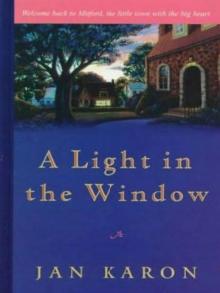 A Light in the Window
A Light in the Window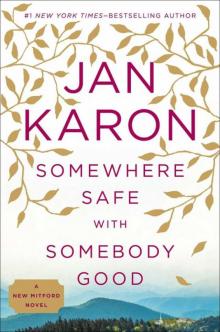 Somewhere Safe With Somebody Good
Somewhere Safe With Somebody Good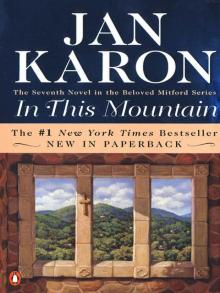 In This Mountain
In This Mountain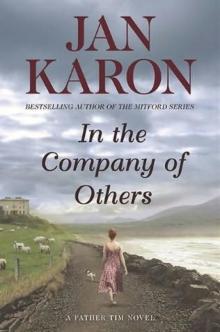 In the Company of Others
In the Company of Others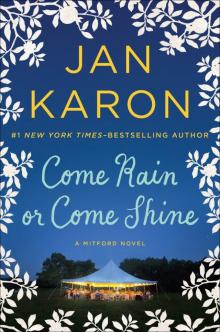 Come Rain or Come Shine
Come Rain or Come Shine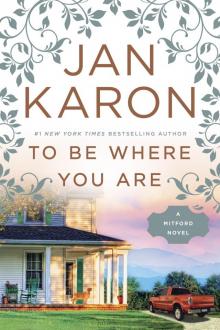 To Be Where You Are
To Be Where You Are These High, Green Hills
These High, Green Hills Light From Heaven
Light From Heaven A New Song
A New Song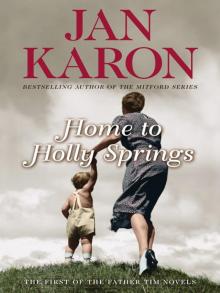 Home to Holly Springs
Home to Holly Springs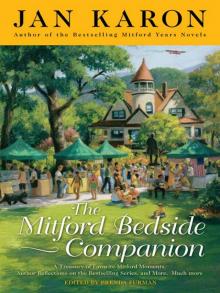 The Mitford Bedside Companion
The Mitford Bedside Companion At Home in Mitford
At Home in Mitford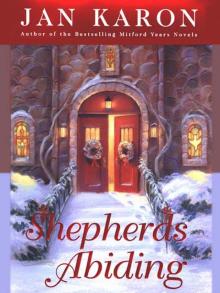 Shepherds Abiding
Shepherds Abiding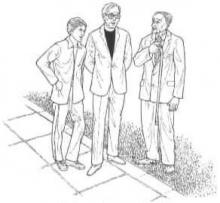 Out to Canaan
Out to Canaan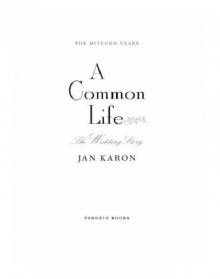 A Common Life: The Wedding Story
A Common Life: The Wedding Story Jan Karon's Mitford Years
Jan Karon's Mitford Years